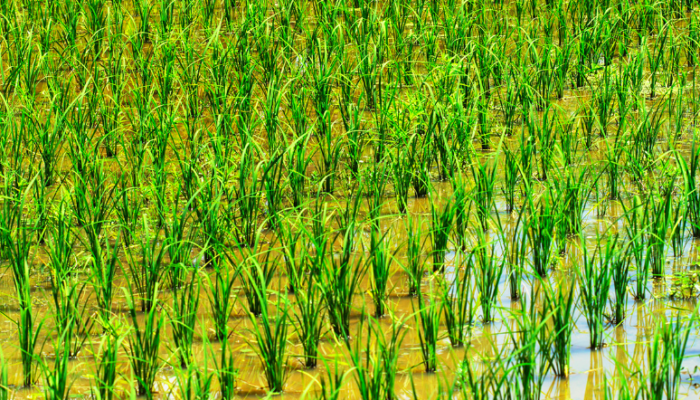Boosting rice production in order to cut import bills and create jobs is a central pillar of Sierra Leone’s new national development plan.
The government of Sierra Leone, which marks its first year in office in April, has made increased rice production one of the key pillars of its development strategy, with hopes of achieving self-sufficiency in the staple food in “the shortest possible time”.
In addition to the $34m set aside in this year’s budget to support the cultivation of rice and other food crops, the government recently signed a $12m financing agreement with the International Fund for Agricultural Development (IFAD) that will channel funding and other support to smallholders.
This scheme will provide assistance to those engaged in the production of cash crops like cocoa and coffee.
President Julius Maada Bio pledged during last year’s election campaign that he would make agriculture, especially rice production, a major priority.
“We are going to charge forward with the pledges – free quality education and agriculture – and deliver on our promises,” he reiterated.
Sierra Leone’s economy is essentially agrarian, with upwards of 75% of its 7.5m people employed in agriculture.
Approximately 70% of the youth population are unemployed or underemployed, and policymakers believe that agriculture could help to solve the problem.
Since 53% of the workforce of 3m is made up of women, the government believes that a coherent strategy will also benefit this traditionally disadvantaged group.
From the 1950s until the mid-1970s the country was an exporter of rice.
Today, it is a net importer of the crop, putting a strain on scarce foreign exchange. In a situation where revenues from cash crops like cocoa and coffee cannot cover the food import bill, the result has been worsening trade and balance of payments figures.
UNCTAD figures reveal that in 2009/10, food imports (as a percentage of total commodity imports) amounted to $151m (32%), rising to $387m (60%) in 2014/15. In 2017, rice alone accounted for 15%, with a spend of $190m.
Five-year plan
According to Tamba Lamina, Sierra Leone’s high commissioner in London, the problem will be tackled by the government’s integrated agricultural policy, part of a new five-year, $8bn national development plan unveiled by the president in February:
“We believe that by halving (the import bill), or eliminating importing rice, the foreign exchange that is saved can go into developing other industries”.
The measures being spearheaded, in partnership with the World Bank, IFAD and private sector companies, are intended to increase the mechanisation of agriculture, promote research and development of improved varieties of rice, cocoa and coffee, and enhance livestock production.
Sceptics say the plan, endorsed by the IMF and the World Bank, is overly reliant on private sector participation in a country that struggles to attract investment.
Total private sector investment in rice production is relatively low, estimated at less than $500m.
There are a limited number of investors, including a Chinese-based consortium, China Hunan – which has signed a deal to cultivate 35,000 hectares – and smaller players like the West African Rice Company, Sewa Farms, and Lion Mountain Agriculture, the latter a conduit for venture capitalists.
Yet there is much to do if other companies are to be attracted.
“The investment we have seen so far is a good start,” says a government source. “But it is still a long way short of what this country needs to meet our self-sufficiency goals. We need up to three times that level.”
Two-pronged approach
Would the government step in to pick up the slack if private sector investment could not provide the jobs or resources needed for development?
For instance, would the government set up a state rice farm to create jobs and feed the nation?
“What the government is actually doing is empowering people in the rural areas, bringing in mechanised farming, giving them the sort of income in terms of short-term loans in order for them to develop agricultural land,” says Lamina.
“But it has to be a joint approach.
No government in any developing country can carry the burden of the whole nation without the private sector stepping in… If we have the right laws, people can come and invest and our people can benefit from it.
So it’s a two-pronged approach; government is doing its own, in terms of empowering the rural communities, but we also need private sector investment.
With the right regulation, they can come in, they can assist. It’s a win-win situation, they get their profits and we get our benefits as well.”
Towards food self-sufficiency
Sierra Leoneans hope that Bio’s reforms will lead them towards food self-sufficiency.
The initiative is part of the government’s aim to diversify away from an economy overly dependent on mining – including gold, diamonds, iron ore, bauxite and rutile.
Rampant gold and diamond smuggling, as well the cessation of iron ore mining due to falling prices and the Ebola outbreak of 2014-16, served to reinforce the danger of a one-track economy.
The marine and tourism industry have also been targeted for a revamp, while agro-based industries are being encouraged to add value.
Source: African Business Magazine

